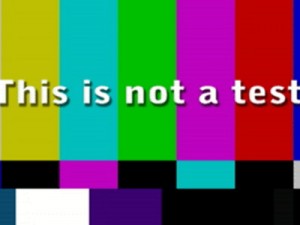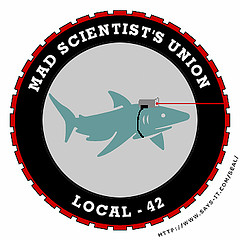July 16, 2013
Dear Frank,
I remember the first time we met. It was my third and final interview for my current job at CCNMTL back in Spring ’04. I was initially anxious, but you immediately made be feel welcome and comfortable. [Over the years I came to appreciate your gift for authentically connecting with just about anyone, often within 30 seconds of meeting them. You dispatched with superficial niceties and blazed trails directly to people’s souls. You bridged intellect and emotion, without a hint of pomp or circumstance, projecting sensitivity and respect to everyone you encountered. Age, class, race, gender – not so much that these dimensions were irrelevant, but you always managed to connect with the individual. You actually listened. And learned.] During that interview I remember walking into your office, encircled floor to ceiling with books. You asked me about my undergraduate senior thesis, a topic I hadn’t revisited in almost a decade, and then proceeded to pull Julian Jaynes off the shelf. You showed me your photo with Allen Ginsberg, and then asked me if I recognized the person in another grainy b/w photo. When I correctly identified Wittgenstein I was pretty confident I had landed the job. But, more importantly, I had found a new mentor.
We didn’t interact very often my first summer at CCNMTL. I worked in Butler library, under Maurice’s supervision, and you were keeping summer hours, at your office in Lewisohn. When Fall rolled around I was eager to enroll in classes, and begin my graduate journeys, but I was nervous about signing up for a course with my boss. You never made me feel like a subordinate, but I was scarred from my relationship with management at previous jobs, and wasn’t sure what it would be like for us to enter into a student-teacher relationship. I hadn’t quite figured out that that was the only kind of relationship that you knew how to cultivate, although our roles were constantly revolving and inverting, as you shared your wisdom, and facilitated growth in every exchange. You brought out the best in everyone around you, rarely content to talk about people or events – always rushing or passing your way into the realm of the Forms. As I reflected when Robbie retired, I chose to enroll in your legendary Readings seminar after one of your students (I think it was Joost van Dreunen) made the case that your syllabus was your text on social/cultural/critical/communications/media theory.
That year was invigorating. I remember rediscovering the joys of school, as I learned to reclaim spaces of intellectual exploration and play, and translate them into action. On the surface, our seminars resembled office meetings, but the luxury of non-directed (not to be confused with non-purposeful) conversation, which was a privilege I needed to readjust to.
Together we figured out ways to weave together disparate threads of my life – work, hobbies, play, passions – somehow, I learned to integrate these (often inconsistent) vectors into a unified construct. A self, I suppose. But, it was my self, not one you imposed on me. It never felt like you pushed your agendas or ideologies on me – rather, you always wanted to help me discover what I really want to think about and work on. And I know that I’m not the only one that believes this – this was your way.
I often wish you had written more, although your autobiographical text is a multi-volume, multi-dimentional, multimedia masterpiece. Sometimes I wonder how seriously you took Socrates’ critique of writing, along with his commitment to be a midwife for ideas. Did you lose count of the number of dissertations you helped deliver?
One under-studied paper that you published, “Who controls the canon? A classicist in conversation with cultural conservatives,” (Moretti (1993), Teachers College Record, 95, pp. 113-126) captures many of the paradoxes you embodied and worked through. A radical classicist, a skeptical optimist, a scientific artist, a philosophical craftsman, an institutional revolutionary. Somehow, you integrated these roles with a career trajectory that not even the most advanced detectors in the Large Hadron Collider could trace. I watched you start countless conversations with a Greek or Latin etymology, charming the academics, administrators, and funders alike in a display of the continuing power of the Western cannon. You constantly reminded us of the classical education that many of our favorite thinkers received, and insisted we read them against that backdrop. But, more importantly, a reminder of how radical these thinkers all were in their own time, and how likely they themselves would be protesting the ossification of the cannon, if they were around today. These lessons will live on through one of the last projects you initiated, Decolonizing the Cannon, which a number of us are committed to follow through with. After 25+ years of reading Homer every fall, it will take us a lifetime to reconstruct the lesson plans you left behind.
In the 9 years that I’ve known you we’ve been to hell and back. We’ve studied together, traveled together, worked together, gotten sick and healed together, but all the while kept our senses of humor. I’ve read many beautiful eulogies about you, but in this letter I want to emphasize your enduring sense of humor. You were a funny man. LMAO funny. Slapstick funny. Dada surrealist funny. Hashish funny. Plenty of the humor was dark, and perhaps, as your student Ruthie suggested to me recently, your humor helped shield you from the brutal injustices that you perceived and experienced all around us. But you were also sometimes a klutz, in an absentminded-professor sense, and a disorganized mess. A creative mess, but a mess. But, I have to say, that even when you were operating on scripted autopilot, you were way better than most people at their best. There wasn’t much you enjoyed more than being called out for your lapses in attention, and my glimpses of your inner monologue were often hysterical. I think that your analysis of power led you to conclude the the world was simply absurd. We all witnessed you acting on this with gravitas and determination, but in the minutia of our micro-interactions, there was always a wide smile and a belly laugh. I don’t think any of us will ever forget the sound of your laugh. (Or, your bark. Man, did you love to throw down and argue. But, that’s another post.)
After I started taking classes with you, it didn’t take me long to realize that that the secret to understanding what you were talking about was knowing what you were reading that week. You would basically have one conversation all week long, no matter who you were talking to. I imagine it was bewildering to many of my coworkers when you brought up false-needs, or commodification at our weekly staff meetings, but if people paid close attention, they could almost observe the wheels spinning all week long, as you lived the theorists you were teaching through the practice of our projects. I often explained to people the incestuous nature of my work/school commitments by comparing my situation to a graduate student in the natural sciences. They might spend 40-60 hours a week in a lab, and working for you was about as close as I could imagine to working in a communications lab. I often wondered how many of my cohorts managed to keep up on developments in new media (and many of them certainly did) without the ambient immersion in a practice that exercised and embodied the theories we were reading.
When summer vacation rolled around, you never quit. I remember how you used to talk about the stretch of time between Sept-May as one long sprint (as long as I’ve known you, you’ve taught at least 2-2 + advising phd students + multiple committees at TC and the J-School, on top of your administrative responsibilities as executive director at CCNMTL and a senior officer in the libraries) , but you didn’t exactly slow down in the summer either. Or, perhaps I should say that you did slow down, but you never stopped teaching and learning. For at least 3 or 4 summers I participated in “slow reading groups” with you and a few of your dedicated students. We didn’t get any credit for these sessions, and you didn’t get paid. We would sit in your office, and go around the table reading a book out loud, pausing whenever we needed clarification. And, we often needed clarification. You were convinced that no one was reading anything closely anymore, and that the hundreds of pages that were assigned in courses each week were flying by without students or teachers taking the time to slow down and absorb them. The second summer we tried this we read Latour’s Politics of Nature, a text we all internalized and will never forget.
You had such a funny relationship with technology. You loved gadgets, but were constantly thwarted and befuddled by them. I wonder how many laptops and phones you lost or broke in the years we have known each other. You never stopped learning, but were suspicious of every new tool that showed up, and the more hype around the tool, the more you growled defensively at it. But often, after months of critiquing and berating something, you would come around and start appreciating it. While some of my coworkers/cohorts seem to have chips on their shoulders about the ineffectual futility of technological interventions, you had an optimistic will that allowed you to wield technology like you wielded the classics. Opportunistically, and instrumentally, in the service of social justice. That was your gig. Relentlessly. Sometimes I wonder if you felt like you had painted yourself into a corner with all of your critiques — like when you whispered quietly to me that you wanted to learn how to use Second Life, without blowing your critical cover.
Last week I ran into an ex-girlfriend that I hadn’t seen in over 10 years. It was nice to reconnect, and in the course of our conversation I realized that we hadn’t spoken since I had started working and studying at Columbia. I was an entirely different person back then, one I barely recognized. Perhaps people return to graduate school in order to change, but true transformations require a relinquishing of your old identity and ego, without a clear idea of what might emerge on the other end. The Judaic tradition has a teaching that anyone who teaches you the alphabet is considered a parent. You literally taught me the alphabet, as we revisited the alphabet as a revolutionary communications technology (via Eric Havelock), and you taught me many other alphabets and languages that gave me access to entire new worlds. You also invited me into your home, and made me feel like I was part of your family. Most of all, you modeled and embodied an honesty, integrity, and sheer force of will that I am blessed to have intersected.
Safe travels, Frank, and enjoy your vacation.
Love,
/J
- NY Times Obituary
- CCNMTL Announcement: Frank A. Moretti (1943-2013)
- Facebook Page
- Coming soon: Memorial site
“So what?!?” – Wikimedia ’06 Plenary session at Wikimedia ’06 in Cambridge, multimillionaire philanthropist Brewster Kahle presents his vision for the Internet Archive, and Frank steps up for the Q&A. Classic brilliance.
 Filed by Jonah at 1:21 am under aesthetics,air,earth,education,epistemology,ethics,fire,fourthestate,metaphysics,playasbeing,water
Filed by Jonah at 1:21 am under aesthetics,air,earth,education,epistemology,ethics,fire,fourthestate,metaphysics,playasbeing,water
 2 Comments
2 Comments





 Today I attended a
Today I attended a 
